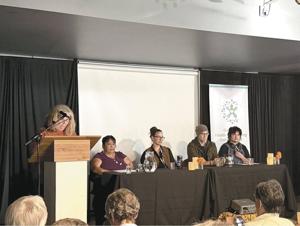Entertainment
Gabriola Community Confronts Toxic Drug Crisis in Panel Discussion

On September 27, the Gabriola Health and Wellbeing Collaborative (GHWC) hosted an impactful event titled “Ask Anything,” wrapping up its Building Hope series focused on the ongoing toxic drug crisis affecting the community. Despite an early morning power outage that left over 1,100 customers without electricity on Gabriola and Mudge Islands, attendees gathered at the Gabriola Theatre Centre to hear from a panel of community members who shared personal stories of addiction and recovery.
The event featured the newly appointed Chief Medical Officer for Central Vancouver Island, Dr. Tribesty Nguyen, along with several survivors of addiction. Dyan Dunsmoor-Farley, vice president of the Gabriola Health Care Foundation, expressed her satisfaction with the event’s success, stating, “We heard some real, hard truths from people who lived through the toxic drug crisis… It tells me a lot about what we as a community can do to help them.”
The Building Hope series included six articles published over the summer, detailing the experiences of Gabriolans grappling with addiction as the toxic drug poisoning public health emergency continues into its ninth year. The first of the last two installments, outlining actionable steps for community involvement, is currently available, with the final piece set to be released later this fall.
Attendees had the opportunity to connect with Sang Brown from the Poison Drug Action Table, who emphasized the importance of ongoing dialogue about addiction. “It would be awesome to further the conversation and get feedback,” said Brown. “If we could find a way to keep the conversation going and get feedback on how people were affected by it, what their idea of harm reduction is, and if they learned anything new.”
The panel was moderated by Janet Vinet, Oceanside Regional Coordinator of the Health and Wellness Network with United Way. She introduced the panelists, who each shared their experiences and insights. Among them was Shannon Whitham, Central Island Regional Harm Reduction Coordinator with Islands Health and the B.C. Centre for Disease Control. Whitham spoke candidly about her own journey with addiction, noting, “It’s always hard talking about our own personal experiences… But it’s important to challenge stigma.”
Lorelei James, an Indigenous panelist, recounted her struggles with alcohol addiction and the pivotal role her mother played in her recovery. “I finally started to get help… My mom worked in a treatment center for alcohol and drugs… she introduced us to tools to get help from the trauma of alcoholism,” said James, who emphasized the need for safe environments for those struggling with addiction.
Another panel member, musician Ben Sams, shared his early experiences with drugs, which began at the age of 11. After years of battling addiction, he has now been sober for six years and actively supports others in their recovery journeys. “I had to face that I was the problem… Now I sponsor people on their own path to recovery,” he stated.
Also contributing to the discussion was Qui Sepulveda, a youth worker who found recovery through safe supply sites. They highlighted the ongoing challenges faced by young people in the toxic drug crisis, stating, “We didn’t know that drugs were poisonous… it’s only gotten worse.”
The panel engaged with a diverse audience, including family members seeking to understand addiction better. The overarching message was clear: recovery requires readiness and support. “People need to come to those decisions on their own… they shouldn’t be sentenced to death for choosing to still use,” emphasized Whitham.
Following a brief intermission, Dr. Nguyen presented data on the toxic drug crisis in the region. He noted that the Nanaimo Regional District is disproportionately affected compared to other areas under Island Health’s jurisdiction. In 2024, the British Columbia Emergency Health Services reported a record 31 overdose calls from Gabriola Island, indicating a pressing issue within the community.
Dr. Nguyen outlined four strategies that could aid in addressing the crisis: regulation, harm reduction, treatment, and prevention methods based on scientific evidence. He also announced that naloxone training would be offered at the fire hall on October 16.
The “Ask Anything” event not only provided a platform for sharing personal stories but also fostered a sense of community solidarity in confronting the ongoing challenges posed by the toxic drug crisis. As the Building Hope series concludes, the hope is for continued engagement and dialogue to support those affected by addiction in Gabriola and beyond.
-

 Politics4 weeks ago
Politics4 weeks agoSecwepemc First Nation Seeks Aboriginal Title Over Kamloops Area
-

 World5 months ago
World5 months agoScientists Unearth Ancient Antarctic Ice to Unlock Climate Secrets
-

 Entertainment5 months ago
Entertainment5 months agoTrump and McCormick to Announce $70 Billion Energy Investments
-

 Science5 months ago
Science5 months agoFour Astronauts Return to Earth After International Space Station Mission
-

 Lifestyle5 months ago
Lifestyle5 months agoTransLink Launches Food Truck Program to Boost Revenue in Vancouver
-

 Technology3 months ago
Technology3 months agoApple Notes Enhances Functionality with Markdown Support in macOS 26
-

 Lifestyle3 months ago
Lifestyle3 months agoManitoba’s Burger Champion Shines Again Amid Dining Innovations
-

 Top Stories2 months ago
Top Stories2 months agoUrgent Update: Fatal Crash on Highway 99 Claims Life of Pitt Meadows Man
-

 Politics4 months ago
Politics4 months agoUkrainian Tennis Star Elina Svitolina Faces Death Threats Online
-

 Sports5 months ago
Sports5 months agoSearch Underway for Missing Hunter Amid Hokkaido Bear Emergency
-

 Politics5 months ago
Politics5 months agoCarney Engages First Nations Leaders at Development Law Summit
-

 Technology5 months ago
Technology5 months agoFrosthaven Launches Early Access on July 31, 2025








